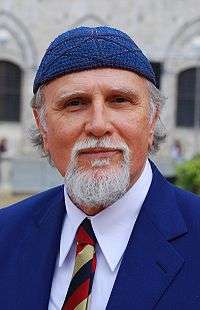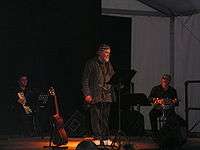Moni Ovadia
Moni Ovadia (born 16 April 1946 in Plovdiv) is an Italian actor, musician, singer and theatrical author. "Moni" is short for "Salomone" (Solomon).

Life and career
Ovadia was born in Plovdiv, Bulgaria, in 1946 to a Jewish family who moved to Milan in Ovadia's early childhood. He attended Milan's Jewish school.[1] Here he graduated in political science and made his debut in the theatre world under Roberto Leydi, as singer and musician in the band Almanacco Popolare. In 1972, he founded a company, the Gruppo Folk Internazionale, playing mainly songs and music from the Balkans.
Ovadia's debut as a theatrical actor was in 1984. In 1990, he created the Theatre Orchestra and produced Oylem Goylem, which he successfully toured in Italy, France, Germany and USA. Oylem Goylem (Yiddish for "The world is dumb") skillfully melded satire and klezmer music sung by Ovadia himself. In 2005, the spectacle was broadcast by RAI, Italy state TV.
In 1995, Ovadia wrote Dybbuk, about the Shoah, considered one of the most important Italian theatrical shows of the period. In the same year, he produced Taibele e il suo demone and Diario ironico dall'esilio, written with Roberto Andò. His following spectacles include Ballata di fine millennio (1996), Pallida madre, tenera sorella (1996), Il caso Kafka ("The Kafka File", 1997, with Andò), Trieste, ebrei e dintorni (1998), Mame, mamele, mamma, mamà... (1998), Joss Rakover si rivolge a Dio (1999), il banchiere errante (2001), L'armata a cavallo (2003).
In 2005, he collaborated with the band Modena City Ramblers for their album Appunti partigiani.

He has been an outspoken opponent of what he regards as growing racism in Italian society. He received an award from the University of Pavia in October 2007; in his acceptance speech he denounced the treatment of immigrants, especially Roma.
In 2009, he appeared in the movie Memories of Anne Frank.
In Sept./Oct. 2003, Ovadia gave an extensive interview to Vered Zaykovsky of the Israeli cultural magazine Eretz acheret.[2]
A long time advocate of the cultural rights of persons with disabilities, on the 20 June 2013 Ovadia held for the first time a full representation in Italian Sign Language of "Il registro dei peccati", one of his most famous monologues. The project was commissioned by and held at SoundMakers Festival, the only Italian multidisciplinary art festival fully accessible to persons with sensory disabilities.[3]
He identifies as Jewish and agnostic.[1] He is no longer a member of the Milan Jewish Community, which he joined out of respect for his parents, out of controversies.[4]
Books
- 1996 – Perché no?
- 1998 – Oylem Goylem
- 1998 – L'ebreo che ride (book and VHS)
- 1999 – La Porta di Sion. Trieste, Ebrei e dintorni
- 2000 – Ballata di fine millennio (book and CD)
- 2001 – Speriamo che tenga – Viaggio di un saltimbanco sospeso tra cielo e terra (a hilarious autobiography)
- 2002 – Vai a te stesso
- 2005 – Contro l'idolatria
- 2007 – Lavoratori di tutto il mondo, ridete – La rivoluzione umoristica del comunismo
- 2010 – Il conto dell'Ultima cena - in collaboration with Gianni Di Santo,
- 2010 – Introduction to the Italian edition of Yehudi Menuhin's book, Musica e Vita Interiore
Discography
- 1991 Oylem Goylem (Fonit Cetra)
- 1995 Dybbuk (Sensible records)
- 2004 Sulla memoria, con Yesh Gvul di Marco Fusi (CNI Audiocoop)
- 2011 Oltre i confini - ebrei e zingari, con Moni Ovadia Stage Orchestra, (Promo Music Records/Edel)
- 2013 Benvenuti nel ghetto, con gli Stormy Six (BTF)
References
- "Italian Actor Moni Ovadia Quits Milan Jewish Community". Jewish Telegraphic Agency via The Forward. November 11, 2013.
- It can be found at www.jewish-theatre.com.
- Pagura, Maresa. ""SoundMakers": il festival della cultura accessibile". Arte e cultura. Magazine di Informa disAbile. Retrieved January 17, 2014.
- "Moni Ovadia: "Lascio la Comunità ebraica di Milano, fa propaganda a Israele"". Il Fatto Quotidiano. November 5, 2013.
External links
| Wikiquote has quotations related to: Moni Ovadia |
| Wikimedia Commons has media related to Moni Ovadia. |